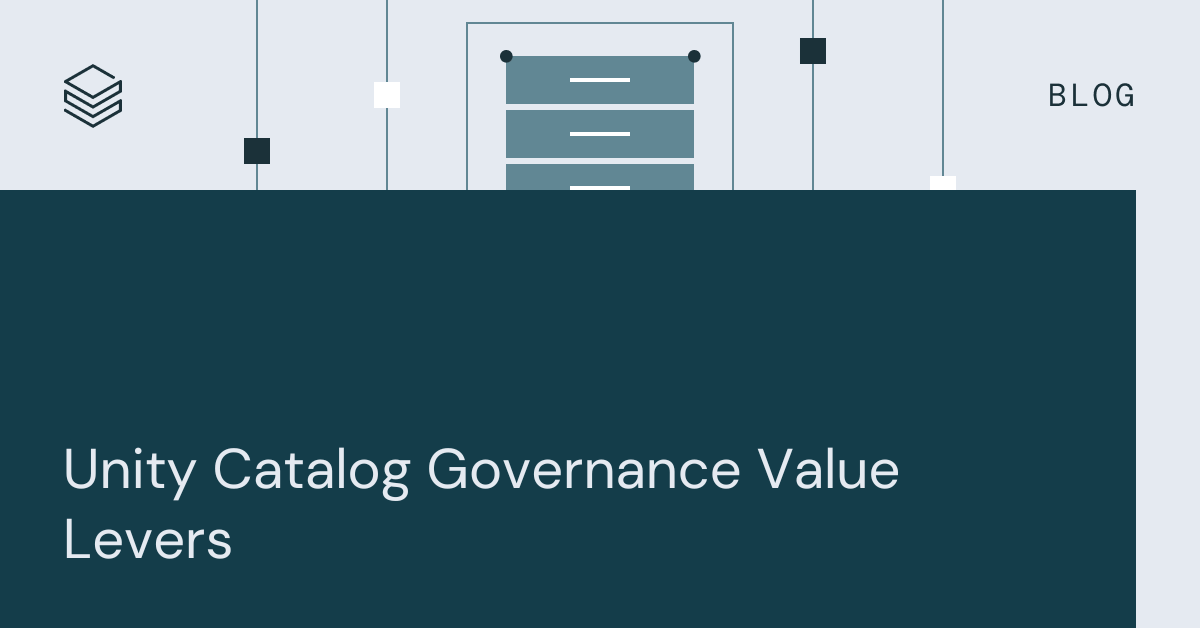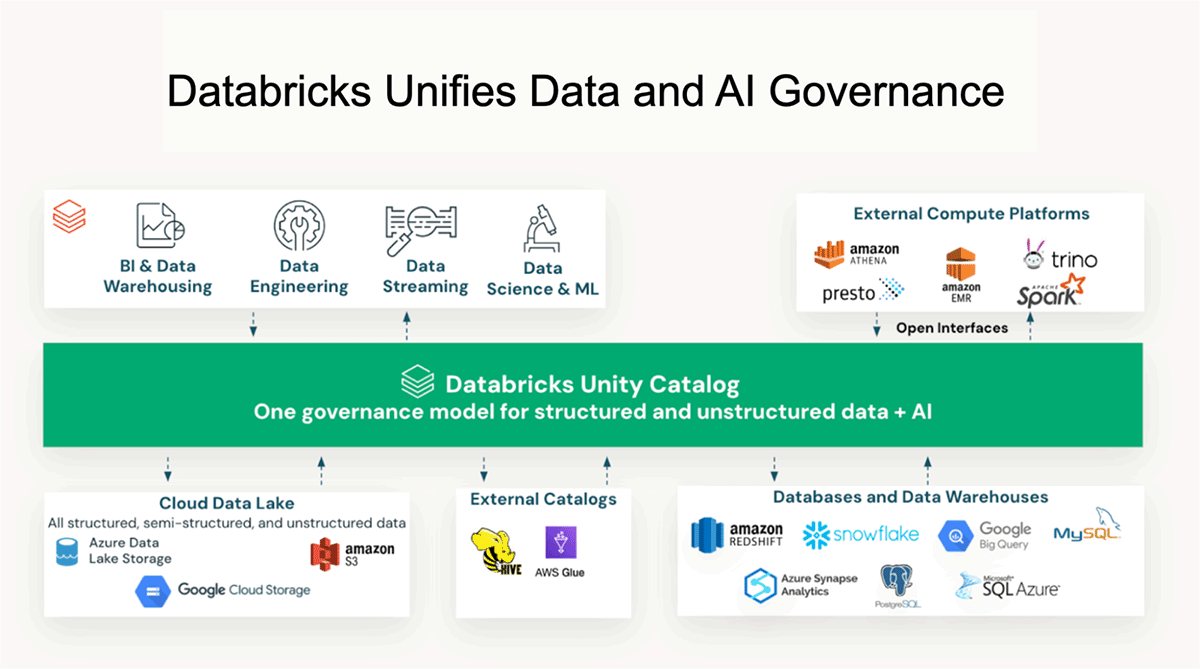Unity Catalog Governance Value Levers

Governance ensures data and AI products are consistently developed and maintained, adhering to precise guidelines and standards. It's the blueprint for architects, bringing their solutions and data vision to life with consistency, guidelines, and standards. It's scale and speed for data engineers with repeatable workflow management. It's collaboratively building and operationalizing AI models for data scientists, with transparency to operationalize at scale. It's security for data managers, ensuring data assets are shared far and wide to benefit all, yet private when needed. It's trust for executives, with transparency of business insights based on their data and AI assets. And it all drives operational efficiency for finance when done with Databricks Unity Catalog.
This blog gives an overview of the many challenges companies face before they standardize on a unified governance solution; it elucidates how the technology enables positive outcomes for their business; and finally, it expounds on the Unity Catalog's value levers that overcome these challenges.
All told, Databricks Unity Catalog is the industry's only single unified governance solution for all of a company's data and AI - across clouds and data platforms. Its foundation is the Databricks Data Intelligence Platform, which understands the uniqueness of your data - and drives the most comprehensive and unified governance solution for all of your company's data and AI. And this itself is built on a lakehouse for open, scalable, low-cost, and high-performance - the best of all worlds!.
So, what are Unity Catalog's main value levers? The blog discusses these five:: mitigating data and architectural risks; ensuring compliance; accelerating innovation; reducing platform complexity/cost while improving operational efficiencies; enabling collaboration and monetizing the value of data.
How does Unity Catalog specifically provide for these positive outcomes? It provides a unified view and discovery of the entire data estate for accelerating innovation, which is quite helpful for data and solution architects. Having a unified solution for access management and auditing not only lowers license costs (many times by 50% or even 90%), but it also enhances data and AI security. By offering comprehensive data and AI monitoring and reporting, it improves trustworthiness for the non-technical and experts alike. By providing a collaborative environment - platform agnostic for data and model sharing, it democratizes every persona within a business unlocking new business values.
Throughout, governance is simplified with intelligence. Data Intelligence enables context-aware search using AI-powered knowledge engines. It automatically generates AI-enhanced descriptions, comments, and documentation. It finds data using natural language - so that non-technical people can ask questions directly themselves - without having to go through their IT staff to create SQL queries. Questions like "Which marketing campaigns are most successful?" or "What vendors have been least productive across my supply chain?" - this is finally the real-life democratization we've been dreaming of coming to life!
The democratization is broad - Unity Catalog unifies data and AI-enhanced governance across BI, Data Warehousing, data engineering, data streaming, data science, and ML. It provides views and controls across all structured, semi-structured, unstructured, streaming data, AI models, notebooks, workplaces, files, tables, and dashboards. It provides more informative and actionable oversight through AI-enhanced holistic search, discovery, and monitoring of usage trends, data lineage, discovery, and model transparency. Whether with natural language or with SQL - organizations that harness this transformative AI-enhanced technology successfully unleash all of their data assets to be leaders in the future.
Overall challenges with traditional non-unified governance
Many organizations have seen the importance of governance for information security, access control, usage monitoring, enacting guardrails, and obtaining "single source of truth" insights from their data assets. As these organizations grow, these governance challenges compound, and without Databricks Unity Catalog, traditional governance solutions no longer adequately meet their needs. Data proliferates, so new unstructured and streaming data sources are added to their traditional data warehouses; divergent technology from multiple vendors transforms into never-ending and risky patchwork solutions; and of course, their assets devolve into "data swamps". The saying that people need "guardrails lest chaos ensues" aptly resonates with enterprise governance.
According to Gartner, By 2026, 20% of large enterprises will use a single data and analytics governance platform to unify and automate discrete governance programs. Without a unified governance architecture on a lakehouse paradigm, organizations face a plethora of challenges:
- Weaker compliance and fractured data privacy controlled across multiple vendors: the sprawl of one governance vendor for data warehousing, others for data lakes, and yet others for streaming data. This and multiple cloud environments lead to expensive, overlapping license costs and a risky lack of cohesive ability to manage.
- Uncontrolled and siloed data and AI swamps: without a "single source of truth" or without intelligent and automated governance across hundreds of thousands or even millions of columns, assets become undiscoverable, unsecured, unmonitored, unreliable, and ultimately unused. This leads to BI reports and AI models that may be missing actionable or up-to-date information, hindering innovation and making informed decisions.
- Exponentially rising costs: by having to constantly shuttle data back and forth among external and internal environments, there is a significant increase in storage fees, slower performance and scale, and increased latency.
- Loss of opportunities, revenue, and collaboration: operational inefficiencies increase as different groups find it harder and harder to obtain proper business insights, and over-duplicate their efforts. The lack of a unified governance platform hinders collaboration and ultimately limits the democratization of data and AI to just a handful of programmers and data scientists.
Lack of a unified governance platform is a top concern across enterprise companies and fails to unleash the true value of their data. According to the 2023 MIT Technology Review insights report, 60% of CIOs said a single governance model for data and AI was a priority. 25% saw their legacy systems as siloed. 25% had inadequate security frameworks. 18% had too many disparate systems.
"That system required a fully dedicated team to support and maintain. Now with Databricks, it's all centralized. Our threat researchers can easily query and make use of that data." — BlackBerry Distinguished Data Architect Justin Lai.
How Databricks Unity Catalog Supports Governance
So, how does this all work from a technical standpoint? Unity Catalog is a layer over existing external compute platforms and assets stored in BI, DW, data engineering, data streaming, and data science & ML. This governance model includes access controls, lineage, discovery, monitoring, auditing, and sharing. It also includes metadata management of files, tables, ML models, notebooks, and dashboards.

Unity Catalog provides a unified single tool for access management, a unified view of the entire data estate, comprehensive data and AI-powered monitoring and observability, and platform-independent sharing and collaboration.
Value Levers with Databricks Unity Catalog
Unity Catalog comes enabled by default with Databricks with no additional costs if you are on premium or enterprise workspaces. If you are a new customer it is enabled by default. It provides value by mitigating risk around compliance, reducing platform complexity and costs, accelerating innovation, and facilitating better internal and external collaboration, monetizing the value of data.
Unity Catalog mitigates risk and ensures compliance
- Unified governance is provided across all data sources and major cloud environments - structured, semi-structured, unstructured, real-time, and GenAI wherever the data source resides.
- Intelligent and automated governance, through Databricks Data Intelligence Platform, leverages AI to best understand the context of tables and columns - which can be impossible to manage by hand.
- One model for safeguarding appropriate access across your full data estate with permissions, row level, and column level security.
- Mitigate compliance risk with centralized auditing across platforms, data lineage, data usage tracking, and auditability.
- Real-time proactive comprehensive governance mitigates risk through full lineage and impact analysis of data changes from raw data to downstream insights. Automated lineage for all workloads in the Databricks Data Intelligence platform.
Unity Catalog reduces platform complexity/cost
- Reduced complexity by governing all data assets including files, tables, ML models, and dashboards, no matter where they live - across clouds and data platforms.
- Reduced license costs by eliminating fees for multiple and overlapping vendors.
- Reduced storage costs by reducing the need to copy and import data across the overwhelming sprawl and minimizing data replication across platforms.
- Faster execution by reducing engineering bottlenecks and greatly reducing the need to move or ingest data from external data sources.
Unity Catalog accelerates innovation
- Automation of data engineering and AI frees staff from an average of 80% of their time-consuming and repetitive tasks to focus on innovation and monetizing value.
- Democratization of data and AI extends innovation to business analysts and line-of-business personas.
- Reducing data fragmentation accelerates the discovery of internal and external data assets, ML models, and GenAI for innovation. Discovery is made easy with a context-aware AI intelligence engine.
- Enabling root cause analysis pinpoints errors and data quality issues in data pipelines, accelerating data trust and increasing confidence in the insights derived from the data.
- Drive product innovations by leveraging external data and optimizing the value chain.
Unity Catalog facilitates collaboration, monetizing the value of data
- Drive ROI improvements into the entire intelligent data application development lifecycle.
- Collaboration platform across personas, internal and external enabling cross-functional development and commercialization.
- Exchange securely sourced high-quality data with customers, suppliers, and partners to fuel rapid business insights.
- Monetizing your data is huge: according to a recent Transparency Market Research study, the global data broker market alone "is forecast to grow $462 billion by the end of the decade."
How does Unity Catalog specifically provide for positive outcomes from a technical standpoint?
The next two blogs in this series will drill down on how specifically Databricks Unity Catalog provides for positive outcomes. The blog Unity Catalog Governance in Action: Monitoring, Reporting, and Lineage shows how Unity Catalog provides:
- A unified view and discovery of the entire data estate for accelerating innovation through the Feature Store and Model Registry, Lineage, Metadata Tagging for data classifications.
- Comprehensive data and AI monitoring for improved trustworthiness through both the Lakehouse Monitoring capability for democratized dashboards and granular governance information that can be directly queried through system tables.
The blog Unity Catalog Governance in Action: Access Management and Sharing shows how Unity Catalog provides:
- One tool for access management and auditing for enhanced data and AI security, is through Lakehouse Federation and SQL.
- Platform-independent data and model sharing and collaboration for unlocking new business values through Delta Sharing, Databricks Marketplace, and Cleanrooms (in private preview, coming in 2024).
Conclusion
Governance is key to mitigating risks, ensuring compliance, accelerating innovation, and reducing costs. Databricks Unity Catalog is unique in the market, providing a single unified governance solution for all of a company's data and AI across clouds and data platforms.
Unity Catalog Databricks architecture makes governance seamless: a unified view and discovery of all data assets, one tool for access management, one tool for auditing for enhanced data and AI security, and ultimately enabling platform-independent collaboration that unlocks new business values.
Below are several links to further your knowledge of Unity Catalog. We hope you find value and look forward to hearing about your successes!


